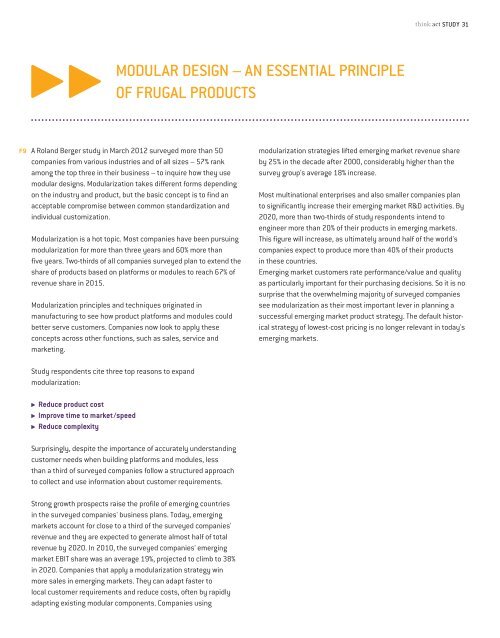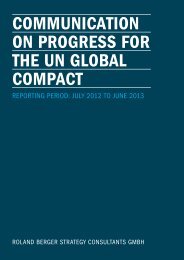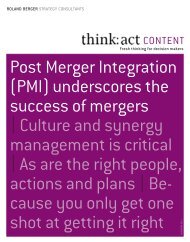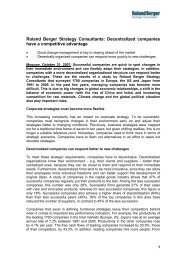PDF, 2492 KB - Roland Berger Strategy Consultants
PDF, 2492 KB - Roland Berger Strategy Consultants
PDF, 2492 KB - Roland Berger Strategy Consultants
- No tags were found...
Create successful ePaper yourself
Turn your PDF publications into a flip-book with our unique Google optimized e-Paper software.
Study 31Modular design – an essential principleof frugal productsf9A <strong>Roland</strong> <strong>Berger</strong> study in March 2012 surveyed more than 50companies from various industries and of all sizes – 57% rankamong the top three in their business – to inquire how they usemodular designs. Modularization takes different forms dependingon the industry and product, but the basic concept is to find anacceptable compromise between common standardization andindividual customization.Modularization is a hot topic. Most companies have been pursuingmodularization for more than three years and 60% more thanfive years. Two-thirds of all companies surveyed plan to extend theshare of products based on platforms or modules to reach 67% ofrevenue share in 2015.Modularization principles and techniques originated inmanufacturing to see how product platforms and modules couldbetter serve customers. Companies now look to apply theseconcepts across other functions, such as sales, service andmarketing.modularization strategies lifted emerging market revenue shareby 25% in the decade after 2000, considerably higher than thesurvey group's average 18% increase.Most multinational enterprises and also smaller companies planto significantly increase their emerging market R&D activities. By2020, more than two-thirds of study respondents intend toengineer more than 20% of their products in emerging markets.This figure will increase, as ultimately around half of the world'scompanies expect to produce more than 40% of their productsin these countries.Emerging market customers rate performance/value and qualityas particularly important for their purchasing decisions. So it is nosurprise that the overwhelming majority of surveyed companiessee modularization as their most important lever in planning asuccessful emerging market product strategy. The default historicalstrategy of lowest-cost pricing is no longer relevant in today'semerging markets.Study respondents cite three top reasons to expandmodularization:Reduce product costImprove time to market/speedReduce complexitySurprisingly, despite the importance of accurately understandingcustomer needs when building platforms and modules, lessthan a third of surveyed companies follow a structured approachto collect and use information about customer requirements.Strong growth prospects raise the profile of emerging countriesin the surveyed companies' business plans. Today, emergingmarkets account for close to a third of the surveyed companies'revenue and they are expected to generate almost half of totalrevenue by 2020. In 2010, the surveyed companies' emergingmarket EBIT share was an average 19%, projected to climb to 38%in 2020. Companies that apply a modularization strategy winmore sales in emerging markets. They can adapt faster tolocal customer requirements and reduce costs, often by rapidlyadapting existing modular components. Companies using
















